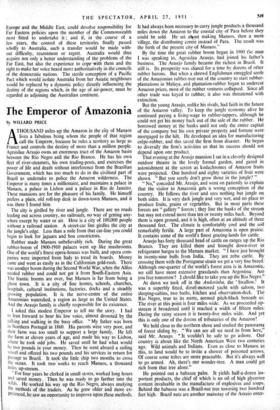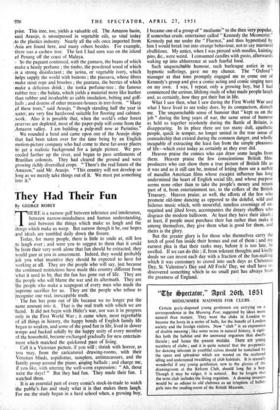The Emperor of Amazonia
gy WILLARD PRICE ATHOUSAND miles up the Amazon in the city of Manaos lives a fabulous being whom the people of that region call the Emperor, because he rules a territory as large as France and controls the destiny of more than a million people. Agesislau Araujo owns an enormous tract of the Amazon basin between the Rio Negro ana 'the Rio Branco. He has his own fleet of river-steamers, his own trading-posts, and exercises the power of life and death without interference from the Brazilian Government, which has too much to do in the civilised part of Brazil to undertake to police the Amazon wilderness. The Emperor is many times a millionaire, and maintains a palace in Manaos, a palace in Lisbon and a palace in Rio de Janeiro. These mansions are for the pleasure of his family. He himself prefers a plain, old roll-top desk in down-town Manaos, and it was there I found him.
The city is girdled by river and jungle. There are no roads leading out across country, no railroads, no way of getting any- where except by water or air. Here is a city of 100,000 people without a railroad station. A street-car line girdles the city at the jungle's edge. Less than a mile from that car-line you could begin to look for jaguars and boa constrictors.
Rubber made Manaos unbelievably rich. During the great rubber-boom of 1900-1910 palaces went up like mushrooms. One of the world's finest opera-houses was built, and opera com- panies were imported from Italy to tread its boards. Money came and went as easily as in the Californian gold-rush. There was another boom during the Second World War, when the Allies needed rubber and could not get it from Souti-Eastern Asia. The frantic booms are over, but Manaos is far from being a ghost town. It is a city of fine homes, schools, churches, hospitals, cultural institutions, factories, docks and a steadily growing population. It is the nerve-centre of the entire Amazonian watershed, a region as large as the United States. And the Araujo family is chiefly responsible for its existence.
I asked this modest Emperor to tell me the story. 1 had to lean forward to hear his low voice, almost drowned by the talking and walking in the busy office. " My father was born in Northern Portugal in 1860. His parents were very poor, and their farm was too small to support a large family. He left the farm at eleven years of age, and made his way to Lisbon, where he took odd jobs. He saved until he had what would be two pounds in your money. Then he went aboard a sailing Vessel and offered his two pounds and his services in return for passage to Brazil. It took the little ship two months to cross the ocean. It took two weeks to reach Manaos, a thousand miles up-stream. " For four years he clerked in small stores, worked long hours and saved money. Then he was ready to go farther into the wilds. He worked his way up the Rio Negro, always studying the methods of the traders. As he grew older and More ex- perienced, he saw an opportunity to improve upon these methods.
It had always been necessary to carry jungle products a thousand. miles down the Amazon to the coastal city of Para before they could be sold. He set about making Manaos, then a mere village, the distributing centre instead of Para. The result was. the birth of the present city-of Manaos."
By the time the great rubber boom began in 1900 tS,e man. I was speaking to, Agesislau Araujo, had joined his father's business. The Araujo family became the richest in Brazil. It
still is. Its prosperity was shared for a time by dozens of other rubber barons. But when a shrewd Englishman smuggled seeds of the Amazonian rubber-tree out of the country to start rubber- plantations in Malaya, and plantation-rubber began to undercut Amazon prices, most of the rubber ventures collapsed. Since all other trade was keyed to rubber, it also was threatened with extinction.
But the young Araujo, unlike his rivals, had faith in-the future of the Amazon valley. To keep the jungle economy alive he continued paying a living-wage to rubber-tappers, although he could not get his money back out of the sale of the rubber. Hi borrowed money at the banks until not only the entire capital.
of the company but his own private property and fortune were mortgaged to the hilt. He developed an idea for manufacturing, crêpe-rubber, and this saved the firm from disaster. He began to diversify the firm's activities so that its success should not depend upon one product. That evening at the Araujo mansion I sat in a cleverly designed outdoor theatre in the lovely formal garden. and gazed in
astonishment at the screen as kodachromes of Amazon fruits were projected. One hundred and eighty varieties of fruit were shown. But you surely don't grow those in the jungle? " " No," conceded Mr. Araujo, and went on patiently to explain that the visitor to Amazonia gets a wrong conception of the
country. He follows the river and sees nothing but jungle on,
both sides. It is very dark jungle and very wet, and no place to produce fruits, grains or vegetables. But in most parts these forests are " gallery " forests ; they line the banks of the stream
but may not extend more than ten or twenty miles back. Beyond them is open ground, and it is high, often at an altitude of three
thousand feet. The climate is comfortably cool and the soil remarkably fertile. A large part of Amazonia is open prairie It contains some of the world's finest grazing-lands for cattle.
Araujo has forty thousand head of cattle on ranges up the Rio Branco. They are killed there and brought down-river in refrigerator barges to the Manaos market. " I have just brought in twenty-nine bulls from India. They are zebu cattle. By crossing them with the Portuguese strain we get a very fine breedi
Although one-quarter of the world's forest area is in Amazonia;
we still have more extensive grasslands than Argentina. Are you free tomorrow? I should like to take you up the Rio Negro." At dawn we took off in the Andorinha, the ' Swallow.' It was a superbly fitted, diesel-motored yacht with saloon, two sleeping-cabins, two baths, kitchen and observation-deck. The Rio Negro. true to its name, seemed pitch-black beneath us The river at this point is four miles wide. As we proceeded up- stream it broadened until it reached a width of fifteen miles; During the rainy season it is twenty-five miles wide. And yet this is only one of the dozens of tributaries of the Amazon!
We held close to the northern shore and studied the panorama' of forest sliding by. ." We can see all we need to from here," said Mr. Araujo. "It wouldn't be safe to go ashore. Our country is about like the North American West two centuries ago. Wild animals and Indians. Even as close to Manaos as this, to land would be to invite a shower of poisoned arrows; Of course some tribes are more peaceable. But it's always well to go armed. Ah. there's our wonder-tree. A man could get rich from that tree alone."
He pointed out a babassu palm. It yields half-a-dozen im- portant products, the chief of which is an oil of high glycerine content invaluable in the manufacture of explosives and soaps., Behind the babassu was a Brazil-nut tree towering two hundred feet high. Brazil nuts are another mainstay of the Arauio enter- prise. This tree, too, yields a valuable oil. The Amazon basin, said Araujo, is unsurpassed in vegetable oils, so vital today tp the plastics industry. Nearly all the oils once imported from • Asia are found here, and many others besides. For example, • there was a cashew tree. The last I had seen was on the island pf Penang off the coast of Malaya.
1. So the pageant continued, with the gumaru, the beans of which .make a heady perfume ; the timbo, the powdered wood of which .is a strong disinfectant ; the jarina, or vegetable ivory, which helps supply the world with buttons ; the piassava, whose fibres r make stout rope and brushes ; the guarana, the berries of which make a delicious drink ; the tonka perfume-tree the famous • rubber tree ; the balata, which yields a material more like leather than rubber and invaluable as cable insulation, belting and golf- . balls ; and dozens of other treasure-houses in tree-form. " Many pf these trees," said Araujo, " though standing half the year in water, are very fine hardwood suitable for flooring and cabinet- , work. Also it is possible that, when the world's other forest reserves are depleted, most of the paper-pulp will come from the Amazon valley. I am building a pulp-mill now at Parintins."
We rounded a bend and came upon one of the Araujo ships that had been taken over for the time being by an English motion-picture company who had come to these far-away places to get a realistic background for a jungle picture. We pro- ceeded farther up the river, and began to pass settlements of Brazilian colonists. They had cleared the ground and were growing richly diversified crops. " There's the real future of the Amazon," said Mr. Araujo. "This country will not develop so . long as we merely take things out of it. We must put something into it."



































 Previous page
Previous page